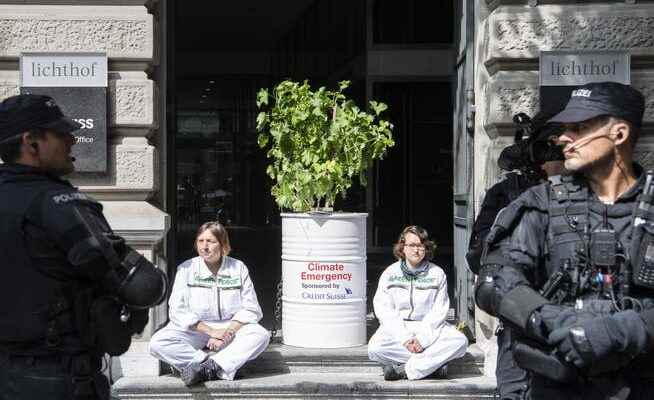How activist can a judge be?
Climate activists, like here in front of Credit Suisse, keep blocking streets and buildings in Zurich.
His activism was fatal to Zurich District Judge Roger Harris. At a court hearing in mid-September, Harris announced that he would consistently acquit climate protesters from now on.
Everyone has the right to demonstrate non-violently, he said, according to a report by the “Republic” at the verdict. Such use of public land is simply to be accepted, and he is no longer willing to support such state punitive actions. Intervention is only necessary in the event of violence.
Because: Unauthorized demos are also protected by the freedom of assembly and freedom of expression, and both fundamental rights are anchored in the European Convention on Human Rights and in the constitution.
He is said to have said to the children of the accused who attended the hearing in the courtroom: “You can be proud of your mother!”
With his statements, Judge Harris brought the Zurich public prosecutor’s office against himself. In two district court cases in which Harris was to serve as a judge, the latter filed a request for recusal due to bias. The trials were scheduled for November and December. Climate activists who had blocked roads were accused.
Can a judge who sides with the climate activists still judge impartially?
He can not. This is the conclusion the Supreme Court has come to. It approved the two requests to withdraw, as can be seen from the two decisions available to the NZZ.
In its decision, the Supreme Court referred to the article in the “Republik”. Distrust in the impartiality of a court person can arise, among other things, from statements that lack the necessary distance to the matter. This is the case here.
The Supreme Court held that the judge’s statements gave the impression that he lacked the necessary distance. The judge is not ready to examine the legal arguments of all parties in upcoming court proceedings. The outcome of the proceedings therefore no longer appears to be open in this respect.
Justice Harris assured the Supreme Court that he did not feel biased or biased in any way. The “Republic” had summarized his statements, the reporting was not neutral. He has no sympathy for climate activists, but wanted to give the children something positive to take with them. At the verbal verdict, he announced that he would reassess each case. However, this must be done against the background of the case law of the European Court of Human Rights.
The decision is not yet final. According to the Supreme Court, an interlocutory decision was appealed.
